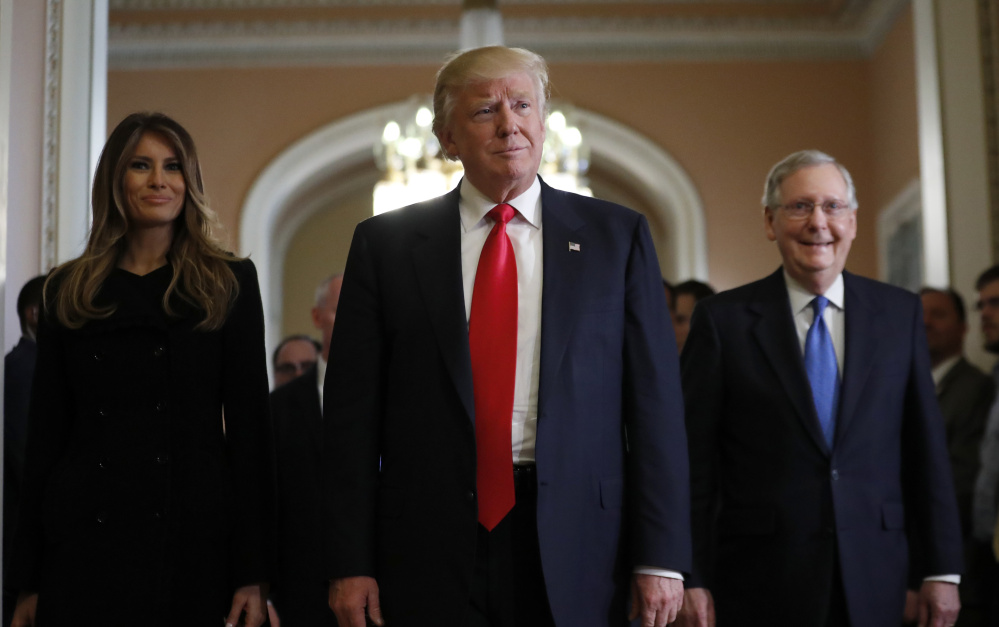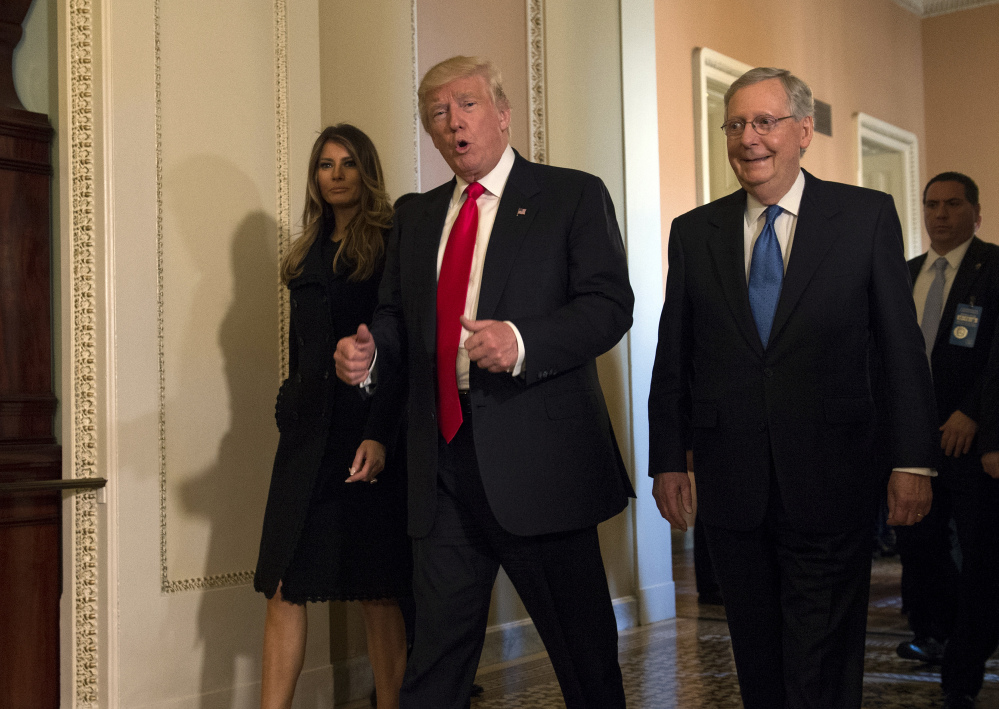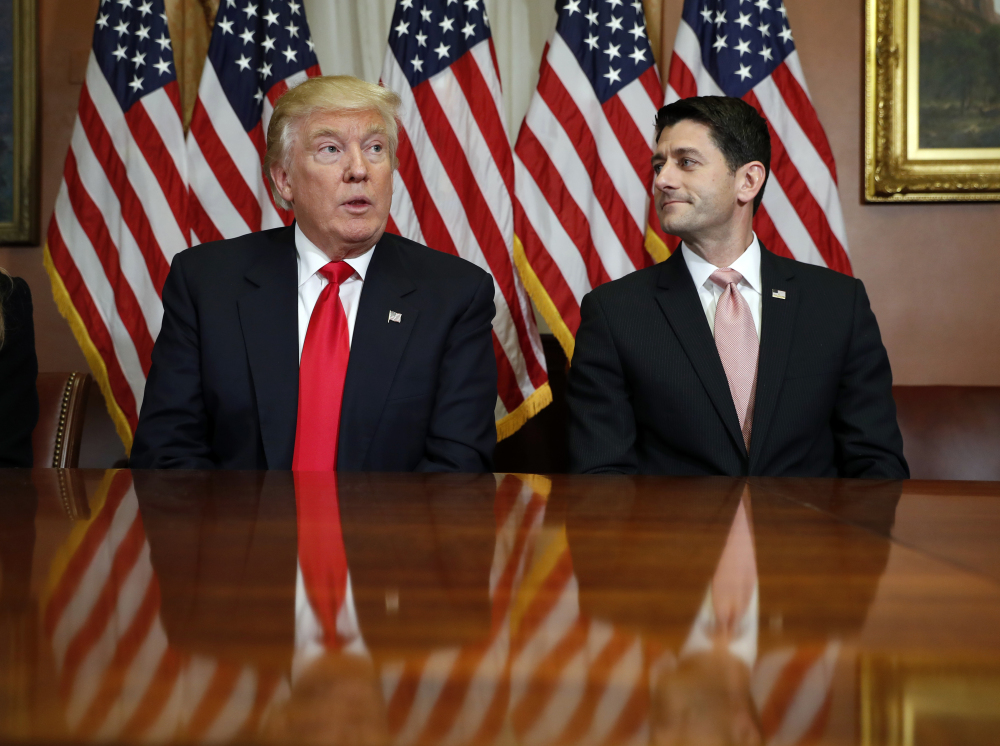The chant echoed through Donald Trump’s boisterous rallies leading up to Election Day: “Drain the swamp! Drain the swamp! Drain the swamp!”
“We are fighting for every citizen that believes that government should serve the people, not the donors and not the special interests,” the billionaire real estate developer promised exuberant supporters at his last campaign rally in Manchester, N.H.
But just days later, there is little evidence that the president-elect is seeking to restrain wealthy interests from having access and influence in his administration.
It’s not just corporate lobbyists who are playing early, visible roles in the new power structure. Some of Trump’s biggest political donors are shaping the incoming administration, including Rebekah Mercer, a daughter of billionaire Robert Mercer, who is figuring prominently in behind-the-scenes discussions, according to people familiar with the transition.
Mercer is among four major donors appointed by Trump Friday to a 16-person executive committee overseeing his transition. The others are campaign finance chairman Steven Mnuchin, New York financier Anthony Scaramucci and Silicon Valley investor Peter Thiel.
Meanwhile, top campaign fundraisers and a raft of lobbyists tied to some of the country’s wealthiest industries have been put in charge of hiring and planning for specific federal agencies. They include J. Steven Hart, chairman of the law and lobbying shop Williams & Jensen; Michael McKenna, an energy company lobbyist who is overseeing planning for the Energy Department; and Dallas fundraiser Ray Washburne, was has been tapped to oversee the Commerce Department.
Billionaires who served as Trump’s policy advisers, such as Oklahoma oil executive Harold Hamm, are under consideration for Cabinet positions.
And Trump is still working to fashion ethical guardrails that would wall him off from his sprawling real estate empire.
On Friday, the Trump Organization said it was focused on identifying how to “immediately transfer” management to his three oldest children – an arrangement government ethics experts said was fraught with conflicts, particularly since his children are also helping oversee the transition.
Meredith McGehee, who heads policy and strategy for Issue One, a bipartisan group that aims to reduce the influence of wealthy interests on politics, said there is “tremendous dissonance” between Trump’s rhetoric and early actions.
“Much of what he said was, ‘I’m going to change the game,’ ” she said. “Of all of his messages, that one I think clearly resonated the strongest. That’s going to be incredibly difficult when the people you bring in are the experts at making the game work for them.”
Trump aides and transition officials did not respond to repeated requests for comment about what role donors and lobbyists will play in the administration.
In the few days since Trump’s surprise win, Washington’s lobbying industry – which largely eschewed his candidacy – has clamored for a spot in the incoming administration. The transition team, which is scrambling to make 4,000 political appointments in less than three months, has welcomed lobbyists’ involvement and expertise, according to people familiar with the operation.
“Every presidential candidate at one time or another runs against Washington,” said energy lobbyist Scott H. Segal. “But the last thing in the world any newly elected president wants to do is go into complicated issues with blinders on. As a result, they look to people as advisers and implementers that have a full understanding of the subject matter they are supposed to address.”
The courting started before Election Day, when trade association representatives and lobbyists were invited to transition policy developments sessions. Lobbyists were solicited to give up to $5,000 to finance the transition, a fundraising effort that accelerated last week as the team seeks to collect about $3 million more to hit a $5 million budget, according to a person familiar with the situation.
Jeffrey H. Birnbaum, president of BGR Public Relations, said “all the Washington regulars” participated in the policy meetings, but added that such access is no guarantee Trump will take his cues from K Street.
“Just because a transition task force makes a recommendation doesn’t mean that Donald Trump will follow it,” he said.
Still, the prominence of established Washington figures and wealthy donors comes as a jarring contrast to Trump’s unequivocal rhetoric on the campaign trail, when he decried inside-the-Beltway denizens as “corrupt.”
Ari Fleischer, who served as President George W. Bush’s press secretary, said the policy decisions Trump makes in the early days will directly reflect on his credibility.
“The transition affords him an opportunity to show he’s going to govern consistent with the promises he made,” Fleischer said. “If you are a reformer and you genuinely want to change the system, you ban people who you say you’re going to ban. Anything less starts to represent compromise.”
Michael Toner, who served as general counsel to the Bush-Cheney transition in 2000, said the 10-week period after the election is a key moment for establishing broad ethical policies that will govern the incoming administration.
On the campaign trail, Trump promised to take several specific actions regarding lobbyists, including prohibiting White House and congressional officials from lobbying for five years after they leave government service.
But his transition team has already rolled back some of the restrictions on lobbyists that Barack Obama established for his transition operation in 2008. Among the rules that have been discarded: a ban on lobbyists from contributing financially to the transition and a prohibition on lobbyists working on the transition from overseeing any fields of policy on which they had lobbied in the previous year.
Several prominent lobbyists are overseeing the staffing of departments in which their clients have a direct interest, including energy adviser Michael Catanzaro, a partner at the lobbying firm CGCN, who has represented oil services giant Halliburton, Koch Industries and the petrochemical and refining association American Fuel and Petrochemical Manufacturers.
The Trump team is putting some limits on lobbyists, according to a person with knowledge of the transition. As in past years, those working on the transition have agreed not to lobby any federal agencies they helped staff for a certain period of time. However, the length of the ban is unclear. Obama prohibited such lobbying for a year.
It also remains unclear whether the new president will dole out plum appointments such as ambassadorships to major donors – a practice embraced by his predecessors, including Obama and Bush.
While Trump has repeatedly proclaimed his independence from wealthy donors, at least 330 supporters contributed $100,000 or more to his campaign, the Republican National Committee and pro-Trump super PACs, according to a Washington Post analysis of federal campaign finance reports.
Trump’s biggest backers gave millions, including casino magnate Sheldon Adelson and his wife Miriam ($11.2 million), Home Depot co-founder Bernard Marcus ($7.6 million), wrestling magnate Linda McMahon ($6 million), Robert Mercer ($3.4 million) and poultry executive Ronald Cameron and his wife Nina ($2.9 million).
Together, the top 100 donors donated $82 million to support his bid, with strong support from the finance, gambling and real estate industries.
Another major uncertainty: how Trump will wall himself off from his private company, which has interests around the globe. On disclosure filings, Trump listed involvements in more than 500 companies, some in countries where the United States has sensitive diplomatic or financial relationships, such as Saudi Arabia, the United Arab Emirates and China. Trump companies are partially indebted to banks in Germany and China.
On Friday, Amanda Miller, vice president of marketing for the Trump Organization, said in a statement the company was still “vetting various structures with the goal of the immediate transfer of management of The Trump Organization and its portfolio of businesses to Donald Jr., Ivanka and Eric Trump along with a team of highly skilled executives.”
But ethics experts said putting Trump’s children in charge of his empire would not distance the new president from his assets or avoid conflicts of interest.
Send questions/comments to the editors.





Success. Please wait for the page to reload. If the page does not reload within 5 seconds, please refresh the page.
Enter your email and password to access comments.
Hi, to comment on stories you must . This profile is in addition to your subscription and website login.
Already have a commenting profile? .
Invalid username/password.
Please check your email to confirm and complete your registration.
Only subscribers are eligible to post comments. Please subscribe or login first for digital access. Here’s why.
Use the form below to reset your password. When you've submitted your account email, we will send an email with a reset code.